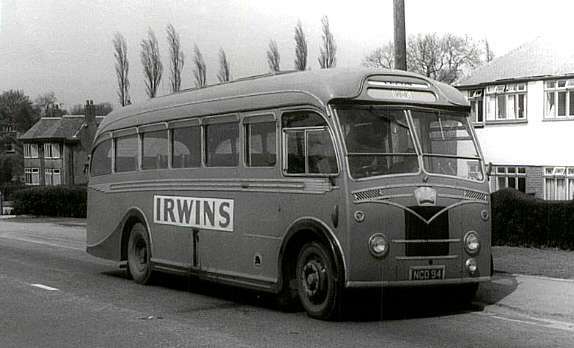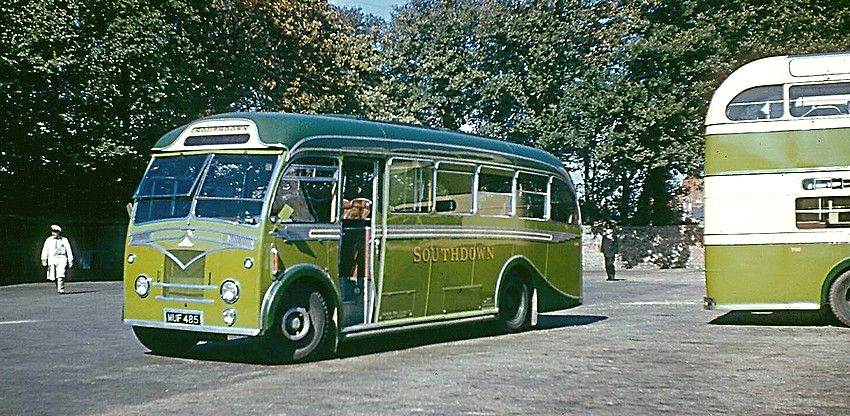
Classic Buses Profiles
Southdown Leyland Tigers - post-war vehicles (by Dick Gilbert)
Last updated 14 June 2020

SOME LINKS WITHIN THIS WEBSITE:
Home
Email
Links
THE COMPLETE WEBSITE MENU
Events Diary
Halfcab list
Small-Ads
Classic Irish Buses
Classic Manx Buses
This series of pages is dedicated to a very special group of vehicles, the glorious and extensive
fleet of Leyland Tiger single-deckers that Southdown operated both before and after the war. This page looks at the post-war buses
and coaches. These links will take you to pre-war coaches and
pre-war buses.
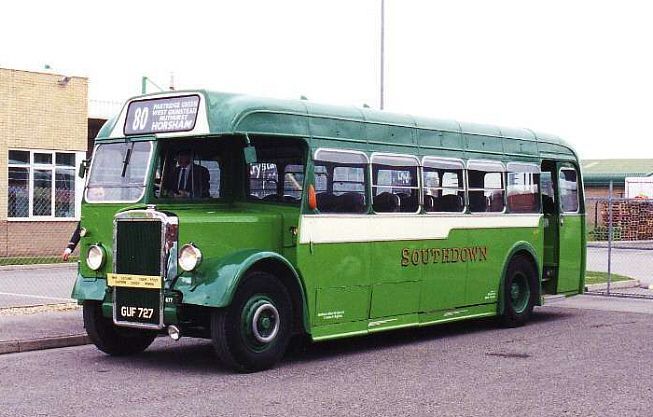
Most unusually, Southdown turned to Eastern Coachworks to build virtually off the shelf bodywork
for its first batch of 25 post-war Leyland Tiger coaches, many of which were given a new lease of life in the mid 1950s after being
converted for bus use. This is numerically the first of the batch (GUF 727), originally no. 1227 but which became 677 when adapted
as a bus in 1955. This, and one other, survives in preservation, and is seen here at Lincoln when photographed in April 2000 by
David Beardmore.
INTRODUCTION AND CREDITS
The Southdown enthusiasts club has a huge
amount of data regarding Southdown buses, and I recommend that you visit their page. They have also been kind enough to let me use
some of their photographs, for which I am most grateful. Owners of other pictures, when known, are also credited. However the
photographers of some pictures on this page are not shown on the original photograph, and therefore are not known to me. Whoever
they were I thank them, and if they contact me with their names they will of course be credited. If a rightful owner wishes me to
remove any hitherto anonymous image, it will be done forthwith.
My particular thanks go to Adrian Clarke for providing a large quantity of information, which has
been a great help in getting this list created. Many others have helped with valuable data - too many to name I'm afraid - but
thanks to you all.
The format for the listing is as follows:
Fleet no., (regn.no.), Tiger model, chassis number (when known), / body manufacturer, manufacturer's
body no. (when known), Southdown body no. (Bxxx), body configuration (except when the entire batch is the same), delivery date,
subsequent modifications, withdrawal date and other notes.
As ever, mistakes are bound to creep in, and some relevant information may be missing so, in order to
make it as accurate a reference as possible, I would of course welcome any additions or corrections.
FLEET LIST
LEYLAND TIGER PS1/1 - 1227-1251 (Total 25)
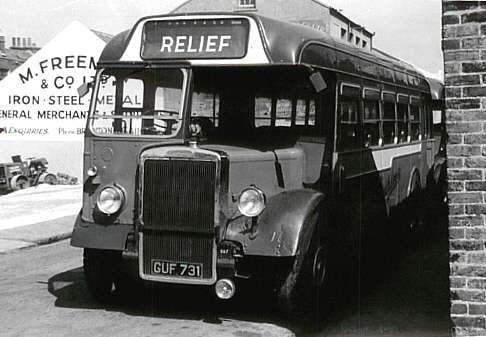
A tiny white number on the nearside dumb iron, above the fog lamp, reveals that this was no. 687,
renumbered from 1231 in 1955 when it was converted to bus configuration. It is shown relaxing in the sun in William Street,
Brighton in the late 1950s with what looks like another Tiger behind it. On the left are the premises of metal merchant M. Freeman
and Co., who (among other things) were awarded the contract to pull up Brighton's tram tracks in 1940 to provide material for the
war effort. Photo; Michael Rooum, London W1.
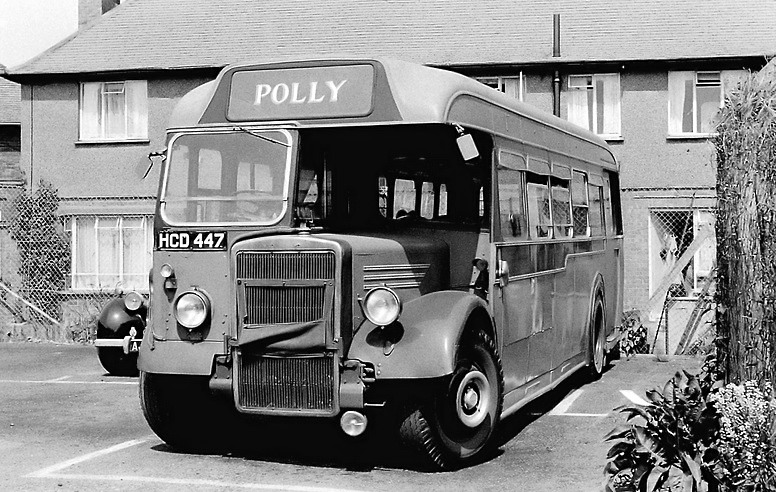
When no. 1247 (later renumbered 676) was retired in 1961, it passed to Eastbourne Corporation
Welfare Department and was used for the transport of the handicapped and elderly. It replaced an ex-Southdown Dennis Falcon in this
role and inherited its name - Polly. It is seen here parked outside the Corporation's Churchdale Road depot. Photo by kind
permission of Cliff Essex.
Delivered between February and May 1947
Chassis: Leyland Tiger PS1/1 (7.4 litre oil engine), 27' 6" long.
Body: Eastern Coachworks C31R, basically the same as was common on Bristol L vehicles at the time, but
with half-drop windows.
Notes: Some of this batch were rebuilt to buses in 1955, and renumbered from 675 upwards (see below).
(Not all have yet been identified).
- 1227 (GUF 727) PS1/1 {461056} ECW {1654 B1706} deliv.4/47, based Worthing 1954. Rebuilt 1955 as B32R, renumbered 677. To Lancing Spastics Society 1960. **SURVIVOR** Paul Jefford, Market Rasen, Lincolnshire 2017.
- 1228 (GUF 728) PS1/1 {461065} ECW {1655 B1707} deliv.4/47, based Portsmouth 1954. Rebuilt 1955 as B32R, renumbered 690, withdrawn 1961.
- 1229 (GUF 729) PS1/1 {461071} ECW {1656 B1708} deliv.4/47, based Bognor 1954. Still active 1956 but out of service by 1961, but in use as a left luggage office at Bognor in 1966, renumbered D691. At Portslade works in 1974. Later owned by the late Bob Gray, Funtley, Hants, but broken up for spares by 1999.
- 1230 (GUF 730) PS1/1 {461121} ECW {1652 B1709} deliv.4/47, based Worthing 1954. Rebuilt 1955 as B32R, renumbered 692, sold 1961 to Wimpey (contractor) as no. 373.
- 1231 (GUF 731) PS1/1 {461173} ECW {1647 B1710} deliv.3/47, based Eastbourne 1954. Rebuilt 1955 as B32R, renumbered 687, withdrawn and in store at end of 1961. With Sussex Branch of British Red Cross Society 1962.
- 1232 (GUF 732) PS1/1 {461174} ECW {1649 B1711} deliv.3/47, based Portsmouth 1954. Rebuilt 1955 as B32R, renumbered 678, still active 1956.
- 1233 (GUF 733) PS1/1 {461216} ECW {1659 B1712} deliv.5/47, based Portsmouth 1954. Rebuilt 1955 as B32R, renumbered 679, based Chichester, withdrawn 1961. Sold to Jackson Transport, Cavan, Ireland and became CID 875. Still with them in 1963.
- 1234 (GUF 734) PS1/1 {461214} ECW {1658 B1713} deliv.5/47, based Portsmouth 1954. Rebuilt 1955 as B32R, renumbered 680. Based at Eastbourne 1960. Sold 1961 to Cowley (dealer) of Salford, then to Jackson Transport Ltd., Cavan, Ireland and re-registered CID 669. Still with them in 1965.
- 1235 (GUF 735) PS1/1 {461218} ECW {1641 B1714} deliv.3/47, based Brighton area 1954. Rebuilt 1955 as B32R, renumbered 683, sold to Simon Carves, Stockport (contractors) in 1960.
- 1236 (GUF 736) PS1/1 {461217} ECW {1657 B1715} deliv.4/47, based Worthing 1954. Rebuilt 1955 as B32R, renumbered 693, sold 1961.
- 1237 (GUF 737) PS1/1 {462037} ECW {1653 B1716} deliv.4/47, based Eastbourne 1954. Rebuilt 1955 as B32R, renumbered 685, sold to Simon Carves, Stockport (contractors) in 1960.
- 1238 (GUF 738) PS1/1 {462038} ECW {1636 B1717} deliv.2/47, based Brighton area 1954. Rebuilt 1955 as B31R, renumbered 682, withdrawn 1961. Sold to Wimpey (contractor) as no. 358.
- 1239 (GUF 739) PS1/1 {462039} ECW {1660 B1718} deliv.5/47, based Worthing 1954. Rebuilt 1955 as B31R, renumbered 688, withdrawn 1961. Sold to Wimpey (contractor) as no. 371.
- 1240 (GUF 740) PS1/1 {462040} ECW {1648 B1719} deliv.5/47, based Worthing 1954. Rebuilt 1955 as B32R, renumbered 675. Sold 1960.
- 1241 (GUF 741) PS1/1 {462041} ECW {1650 B1720} deliv.4/47, based Eastbourne 1954. Rebuilt 1955 as B3?R, renumbered 686. Withdrawn 1960 but still in store 1961. Sold 1962.
- 1242 (GUF 742) PS1/1 {462062} ECW {1651 B1721} deliv.4/47, based Bognor 1954. Active 1956, gone by 1961.
- 1243 (GUF 743) PS1/1 {462061} ECW {1637 B1722} deliv.2/47, based Brighton area 1954. Rebuilt 1955 as B32R, renumbered 695, sold 1961 to Simon Carves, Stockport (contractors) - or to Wimpey as no. 370 ?.
- 1244 (GUF 744) PS1/1 {462063} ECW {1638 B1723} deliv.2/47, based Brighton area 1954. Rebuilt 1955 as B32R, renumbered 696, sold 1961 to Wimpey (contractor) as no. 369.
- 1245 (GUF 745) PS1/1 {462064} ECW {1639 B1724} deliv.3/47, based Portsmouth 1954. Active 1956, gone by 1961.
- 1246 (GUF 746) PS1/1 {462131} ECW {1640 B1725} deliv.3/47, based Brighton area 1954. Rebuilt 1955 as B32R, renumbered 681, withdrawn 4/61.
- 1247 (HCD 447) PS1/1 {462424} ECW {1642 B1726} deliv.3/47, based Portsmouth 1954. Rebuilt 1955 as B32R, renumbered 676. Sold to Eastbourne Corpn. Welfare Dept 1961, and named Polly. In a scrapyard at Lower Dicker, Sussex by 1975.
- 1248 (HCD 448) PS1/1 {462425} ECW {1643 B1727} deliv.3/47, based Portsmouth 1954. Active 1956, gone by 1961.
- 1249 (HCD 449) PS1/1 {462467} ECW {1644 B1728} deliv.3/47, Rebuilt 1955 as B3?R, renumbered 689. Withdrawn 1960, but in use as a left luggage office (renumbered D689) at Bognor 1961-66 and maybe later. Acquired for preservation by Clifford Jones, Wrecclesham, Surrey 1974. **SURVIVOR** with the late Bob Gray, Funtley, Hants. 2020.
- 1250 (HCD 450) PS1/1 {462468} ECW {1645 B1729} deliv.3/47, based Brighton area, rebuilt 1955 as B32R, renumbered 684. Withdrawn 1960. With Dew, Oldham (contractor) 1963.
- 1251 (HCD 451) PS1/1 {462469} ECW {1646 B1730} deliv.3/47, based Bognor 1954. Rebuilt 1955, renumbered 699. Sold 1961 to Wimpey (contractor) as no. 372.
The above batch as renumbered (the first 8 had bus seats, B32R or B31R)
Renumbering details of 1242 (GUF 742), 1245 (GUF 745) and 1248 (HCD 448) not known.
- 675 (GUF 740) Previously 1240. Sold 1960.
- 676 (HCD 447) Previously 1247, sold to Eastbourne Corpn. Welfare Dept 1961, and named Polly (replacing Dennis Falcon no. 81, FUF 181).
- 677 (GUF 727) Previously 1227. To Lancing Spastics Society 1960. ** SURVIVOR **
- 678 (GUF 732) Previously 1232, sold 1962
- 679 (GUF 733) Previously 1233, withdrawn 1961. Sold to Jackson Transport, Cavan, Ireland and became CID 875. Still with them in 1963.
- 680 (GUF 734) Previously 1234. Sold 1961 to Cowley (dealer) of Salford, then to Jackson Transport Ltd., Cavan, Ireland and re-registered CID 669. Still with them in 1965.
- 681 (GUF 746) Previously 1246, withdrawn 4/61.
- 682 (GUF 738) Previously 1238, withdrawn 1961. Sold to Wimpey (contractor) as no. 358.
- 683 (GUF 735) Previously 1235, sold to Simon Carves, Stockport (contractors) in 1960
- 684 (HCD 450) Previously 1250, withdrawn 1960. With to Dew, Oldham (contractor) in 1963.
- 685 (GUF 737) Previously 1237.
- 686 (GUF 741) Previously 1241. Withdrawn 1960 and still in store at end of 1961. Sold 1962.
- 687 (GUF 731) Previously 1231, withdrawn and in store at end of 1961. With Sussex Branch of British Red Cross Society 1962.
- 688 (GUF 739) Previously 1239, sold 1961 to Wimpey Construction as no. 371.
- 689 (HCD 449) Previously 1249. Withdrawn 1960, but in use as temporary luggage and booking office at Bognor as D689 1961-66. ** SURVIVOR **.
- 690 (GUF 728) Previously 1228, withdrawn 1961.
- 691 (GUF 729) used as temporary luggage and booking office at Bognor 1961 numbered D691.
- 692 (GUF 730) Previously 1230, sold 1961 to Wimpey (contractor) as no. 373.
- 693 (GUF 736) Previously 1236, sold 1961.
- 694 Withdrawn Apr 1961.
- 695 (GUF 743) Previously 1243, sold 1961 to Simon Carves, Stockport (contractors) - or to Wimpey as no. 370?
- 696 (GUF 744) Previously 1244, sold 1961 to Wimpey (contractor) as no. 369.
- 697
- 698
- 699 (HCD 451) Previously 1251. Sold 1961 to Wimpey (contractor) as no. 372.
LEYLAND TIGER PS1/1 - 1252-1263 (Total 12)
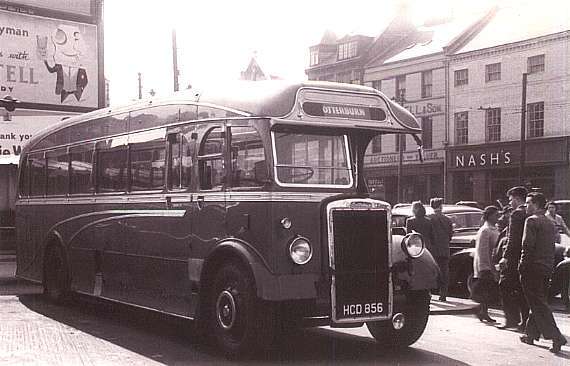
No. 1256 (HCD 856) after sale to Otterburn and District in Northumberland, who clearly kept the
polished radiator surround in very good shape. (photo: unknown)
Delivered during May 1947
Chassis: Leyland Tiger PS1/1 (7.4 litre oil engine), 27' 6" long.
Body: Park Royal C32R using East Kent styling, all with sliding roof.
Notes: All sold in 1958.
- 1252 (HCD 852) PS1/1 {462714} Park Royal {32994 B1731} deliv.5/47, based Eastbourne 1954. Sold 1958. With Ashley and Sons (contractors) in 1961.
- 1253 (HCD 853) PS1/1 {462723} Park Royal {32995 B1732} deliv.5/47, based Eastbourne 1954. Sold 1958. With Bee-Line Roadways (Tees-side) Ltd., West Hartlepool 1958-59.
- 1254 (HCD 854) PS1/1 {462781} Park Royal {32996 B1733} deliv.5/47, based Brighton area 1954. Sold 1958. With Gilbert Ash (contractor) 1958.
- 1255 (HUF 285) PS1/1 {471196} Park Royal {32997 B1734} deliv.5/47, based Brighton area 1954. Sold 1958. With Ash, Stevenage for staff transport 1959.
- 1256 (HCD 856) PS1/1 {462784} Park Royal {32998 B1735} deliv.5/47, based Brighton area 1954. Sold 1958 to Otterburn and District, Northumberland.
- 1257 (HCD 857) PS1/1 {462806} Park Royal {33000 B1736} deliv.5/47, based Chichester 1954. Sold 1958. With Bee-Line, West Hartlepool in 1958-59, sold to Yuill, contractor, West Hartlepool in 1960.
- 1258 (HCD 858) PS1/1 {462805} Park Royal {32999 B1737} deliv.5/47, based Portsmouth 1954. Sold 1958. With Morgan (contractor) 1958. With A. Mason (contractor), Mansfield in 1961.
- 1259 (HCD 859) PS1/1 {462782} Park Royal {33002 B1738} deliv.5/47, based Horsham 1954. Sold 1958. With Bee-Line, West Hartlepool in 1958, sold to Richardson, West Hartlepool in 1959.
- 1260 (HCD 860) PS1/1 {462840} Park Royal {33001 B1739} deliv.5/47, based Brighton area 1954. Sold 1958. With Bee-Line Roadways (Tees-side) Ltd., West Hartlepool 1959. With Yuill (contractor) in Durham 1963.
- 1261 (HCD 861) PS1/1 {470138} Park Royal {33003 B1740} deliv.5/47, based Brighton area 1954. Sold 1958. With Bee-Line, West Hartlepool in 1958, sold to Richardson, West Hartlepool in 1959.
- 1262 (HCD 862) PS1/1 {470142} Park Royal {33004 B1741} deliv.5/47, based Eastbourne 1954. Sold 1958.
- 1263 (HCD 863) PS1/1 {470139} Park Royal {33005 B1742} deliv.5/47, based Horsham 1954. Sold 1958. With Bee-Line, West Hartlepool in 1958, sold to Richardson, West Hartlepool in 1959.
LEYLAND TIGER PS1 - 1264-1269 (Total 6)
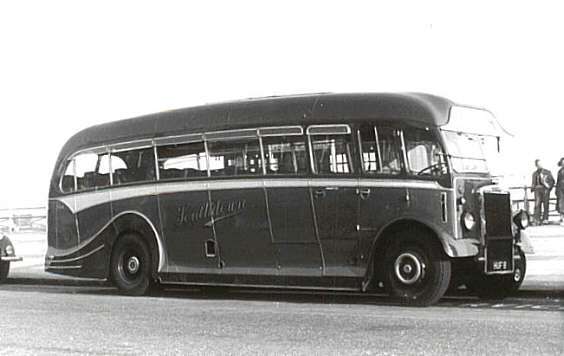
1268 on Brighton seafront in the 1950s. Immediately after the war, coachwork designs were still
copying the trends of the 1930s, but only for two or three more years. (photo: unknown).
Delivered between April 1947 and February 1948
Chassis: Leyland Tiger PS1/1 (7.4 litre oil engine), 27' 6" long.
Body: Harrington C32F, all built with sliding roof. No. 1264 had a half canopy (i.e. no nearside
canopy over the engine).
- 1264 (HUF 4) PS1/1 {470141} Harrington {21 B1743} half-canopy, deliv.4/47, based Brighton area 1954. Active 1957. With Thomas Bros., Llangadock, S.Wales 1959. With Wimpey (contractors) by 1962.
- 1265 (HUF 5) PS1/1 {470140} Harrington {103 B1744} full width canopy, deliv.4/47, based Brighton area 1954-57. With R. I. Davies, Tredegar, Wales 1959.
- 1266 (HUF 6) PS1/1 {470570} Harrington {177 B1745} full width canopy, deliv.9/47, based Brighton area 1954. Active 1957. With R. I. Davies, Tredegar, Wales 1959.
- 1267 (HUF 7) PS1/1 {471300} Harrington {251 B1746} full width canopy, deliv.12/47, based Brighton area 1954. Active 1957. With Roberts, Maerdy, Wales 1959. With Edward Bros., Beddau 1965.
- 1268 (HUF 8) PS1/1 {471101} Harrington {252 B1747} full width canopy, deliv.1/48, based Brighton area 1954. Active 1957. Probably with Williams, Treochy, Wales 1959.
- 1269 (HUF 9) PS1/1 {471071} Harrington {272 B1748} full width canopy, deliv.1/48. Based Brighton area 1954, based Horsham 1957. With W. J. Davies, Leewood in 1959. To Dack, Terrington St.Clement in 1960 - still with them 1963 (But also reported to be with Cook, Leicester in 1960).
LEYLAND TIGER PS1 - 1270-1275 (Total 6)
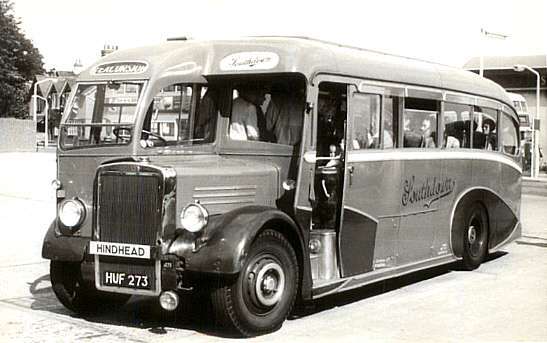
No. 1273, with its handsome Windover Huntingdon bodywork, assembles passengers for a trip to
Hindhead in the 1950s. Photo unknown.
Delivered late 1947 to early 1948
Chassis: Leyland Tiger PS1/1 (7.4 litre oil engine), 27' 6" long.
Body: Windover Huntingdon C32F, all built with sliding roof and half canopies.
Notes: All sold in 1958.
- 1270 (HUF 270) c/n 470198, Windover Huntingdon {6760} B1749, deliv.10/47. Based Chichester 1954. Sold 1958 to P. W. Cherry, Beverley.
- 1271 (HUF 271) c/n 471072, Windover Huntingdon {6761} B1750, deliv.10/47. Based Bognor 1954. Sold 1958 to W. Bellis, Buckley.
- 1272 (HUF 272) c/n 471107, Windover Huntingdon {6762} B2032, deliv.10/47. Based Bognor 1954. Sold 1958 to Prescelly Motors, Clynderwen.
- 1273 (HUF 273) c/n 471297, Windover Huntingdon {6763} B2033, deliv.10/47. Based Bognor 1954. Sold 1958. With Moffatt, Cardenden in 1960.
- 1274 (HUF 274) c/n 471299, Windover Huntingdon {6764} B2034, deliv.11/47. Based Chichester 1954. Sold 1958 to W.J.Edwards, Tredegar.
- 1275 (HUF 275) c/n 471296, Windover Huntingdon {6765} B2035, deliv.11/47. Based Bognor 1954. Sold 1958 to W. G. Vowles, Merthyr Tydfil, seating increased to 33.
LEYLAND TIGER PS1 - 1276-1298 (Total 23)
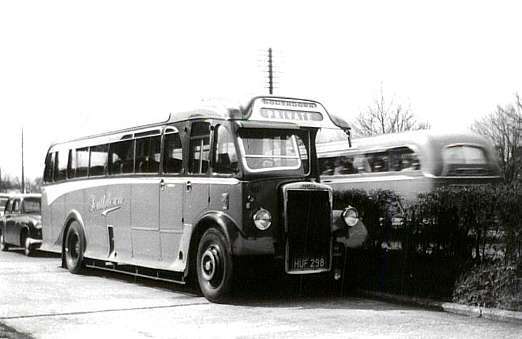
1298, the last of the batch, at rest in the 1950s, while what looks like one of the 1952 all-
Leyland Royal Tigers hurries by in the background. (photo: unknown)
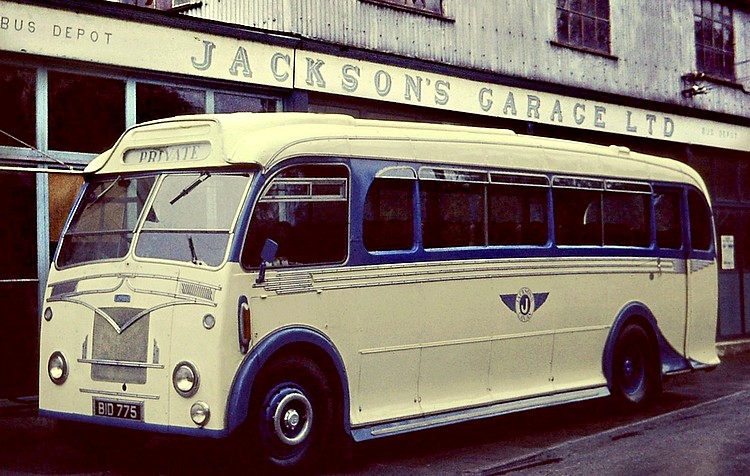
No. 1283 after rebuild by Beadle in the early 1950s and sale to Jackson's of Cavan, Ireland, in
1960. Photo by kind permission of Lawrence Murphy (copyright) via Chris Stanley.
Delivered between December 1947 and August 1949
Chassis: Leyland Tiger PS1/1 (7.4 litre oil engine), 27' 6" long.
Body: Beadle C32R, all built with sliding roof. All rebuilt by Beadle to FC32R full-fronted design
during 1954-55.
- 1276 (HUF 276) PS1/1 {471068} Beadle {464 B2046} deliv.1/48, based Brighton area 1954. Withdrawn 1960, sold to Lane Bros., Chesterfield.
- 1277 (HUF 277) PS1/1 {470895} Beadle {465 B2047} deliv.12/47, based Eastbourne 1954. Withdrawn 1960.
- 1278 (HUF 278) PS1/1 {471069} Beadle {466 B2048} deliv.12/47, based Brighton area 1954. Withdrawn 1960.
- 1279 (HUF 279) PS1/1 {470873} Beadle {467 B2049} deliv.1/48, based Brighton area 1954. Withdrawn 1959. Sold to Jackson, Cavan, Ireland July 1960 and re-registered BID 776; to J. J. Kavanagh, Urlingford by June 1963. With T. J. O'Sullivan, Lislehane, Cork in 1967.
- 1280 (HUF 280) PS1/1 {471197} Beadle {468 B2050} deliv.1/48, based Brighton area 1954. Withdrawn 1960.
- 1281 (HUF 281) PS1/1 {471103} Beadle {469 B2051} deliv.1/48, possibly re-seated to 26 in 1950? Based Brighton area 1954. Withdrawn 1960.
- 1282 (HUF 282) PS1/1 {471073} Beadle {470 B2052} deliv.1/48, possibly re-seated to 26 in 1950? Based Brighton area 1954. Withdrawn 1960, became mobile display van for Levertons, Spalding. Photo by Cliff Essex here.
- 1283 (HUF 283) PS1/1 {470871} Beadle {471 B2053} deliv.2/48, possibly re-seated to 26 in 1950? Based Brighton area 1954, sold July 1960 to Jackson, Cavan, Ireland, registered BID 775. Still with them in 1965.
- 1284 (HUF 284) PS1/1 {471108} Beadle {472 B2054} deliv.1/48, possibly re-seated to 26 in 1950? Based Brighton area 1954, withdrawn 1959.
- 1285 (HUF 285) PS1/1 {462783} Beadle {473 B2055} deliv.2/48, possibly re-seated to 26 in 1950? Based Brighton area 1954. Withdrawn 1958?, and to Taylor, Long Buckby. Then to K.W.Services, Daventry, but sold again in 1959 to Ash (contractor), Stevenage.
- 1286 (HUF 286) PS1/1 {471110} Beadle {474 B2056} deliv.2/48, possibly re-seated to 26 in 1950? Based Brighton area 1954, withdrawn 1960.
- 1287 (HUF 287) PS1/1 {470893} Beadle {475 B2057} deliv.2/48, based Brighton area 1954. Withdrawn 1960 and became a mobile shop in Leigh, Lancs.
- 1288 (HUF 288) PS1/1 {471067} Beadle {476 B2058} deliv.2/48, based Brighton area 1954. Withdrawn 1959. With Reid, Slamannan, Scotland 1960.
- 1289 (HUF 289) PS1/1 {470874} Beadle {477 B2059} deliv.1/48, based Brighton 1954, withdrawn 1960.
- 1290 (HUF 290) PS1/1 {482501} Beadle {478 B2060} deliv.6/49, based Eastbourne 1954, withdrawn 1960 and sold to Rennie, Cairneyhill, Fife. To McLennan, Spittalfield 1963, withdrawn 1968.
- 1291 (HUF 291) PS1/1 {491953} Beadle {479 B2061} deliv.6/49, based Brighton area 1954. Withdrawn 1960.
- 1292 (HUF 292) PS1/1 {491956} Beadle {480 B2062} deliv.6/49, based Worthing 1954, withdrawn 1960. With Leverton, Morley 1965.
- 1293 (HUF 293) PS1/1 {491957} Beadle {481 B2063} deliv.6/49, based Worthing 1954. Withdrawn 1960.
- 1294 (HUF 294) PS1/1 {492054} Beadle {535 B2064} deliv.7/49, based Eastbourne 1954. Withdrawn 1960.
- 1295 (HUF 295) PS1/1 {492224} Beadle {536 B2065} deliv.7/49, based Worthing 1954. Withdrawn 1960.
- 1296 (HUF 296) PS1/1 {492225} Beadle {537 B2066} deliv.7/49, based Worthing 1954. Withdrawn 1960.
- 1297 (HUF 297) PS1/1 {492223} Beadle {538 B2067} deliv.7/49, based Brighton area 1954. Withdrawn 1960, sold to Cooper and Clayton (contractor), Macclesfield (replacing no. 1441).
- 1298 (HUF 298) PS1/1 {492226} Beadle {539 B2068} deliv.8/49, based Brighton area 1954. Withdrawn 1960.
LEYLAND TIGER PS1 - 1299-1311 (Total 13)
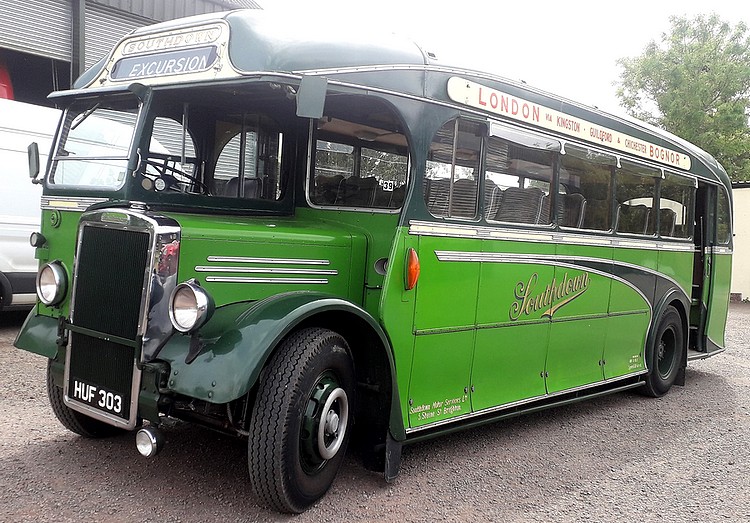
No. 1303 is the only survivor of this batch and is seen here at Corley in 2020. Photo by kind
permission of owner Roger Burdett.
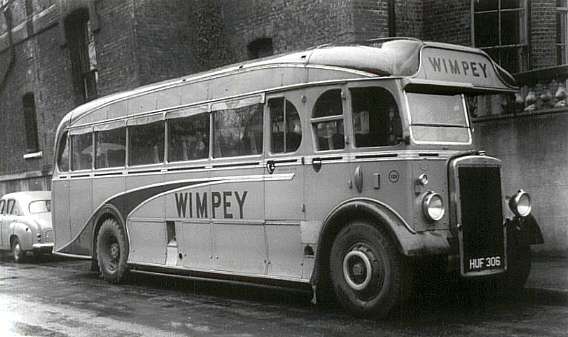
No. 1306 seems to be having a drab life after its sale to Wimpey Construction. These vehicles had
a relatively short life with Southdown, their essentially pre-war styling having gone completely out of fashion within a decade.
(Thanks to Photobus for the picture).
Delivered in March 1948
Chassis: Leyland Tiger PS1/1 (7.4 litre oil engine), 27' 6" long.
Body: Park Royal C32R, all built with sliding roof.
- 1299 (HUF 299) PS1/1 {471102} Park Royal {33009 B2069} deliv.3/48, based Eastbourne 1954, withdrawn 1959. With Silcox, Pembroke Dock 1959.
- 1300 (HUF 300) PS1/1 {471074} Park Royal {33010 B2070} deliv.3/48, based Eastbourne 1954, withdrawn 1959. With Silcox, Pembroke Dock 1959.
- 1301 (HUF 301) PS1/1 {471075} Park Royal {33008 B2071} deliv.3/48, based Eastbourne 1954, withdrawn around 1958. With Stevens Bros., Tredegar in 1958-59. Bought by R. I. Davies, Tredegar by Sept 1959.
- 1302 (HUF 302) PS1/1 {470872} Park Royal {33015 B2072} deliv.3/48, based Eastbourne 1954, withdrawn 1959. Sold to Wimpey (contractor) 1960.
- 1303 (HUF 303) PS1/1 {471195} Park Royal {33016 B2073} deliv.3/48, based Eastbourne 1954, withdrawn 1959. **SURVIVOR** with Roger Burdett, Coventry.
- 1304 (HUF 304) PS1/1 {470897} Park Royal {33018 B2074} deliv.3/48, based Eastbourne 1954, Horsham 1956, withdrawn 1959, with Wimpey (contractor) in 1960.
- 1305 (HUF 305) PS1/1 {470894} Park Royal {33017 B2075} deliv.3/48, based Eastbourne 1954, withdrawn 1959, with Wimpey (contractor) 1960.
- 1306 (HUF 306) PS1/1 {471106} Park Royal {33013 B2076} deliv.3/48, based Eastbourne 1954, withdrawn 1959, with Wimpey (contractor) in 1961.
- 1307 (HUF 307) PS1/1 {470870} Park Royal {33011 B2077} deliv.3/48, based Eastbourne 1954, withdrawn 1959, with Wimpey (contractor) 1960.
- 1308 (HUF 308) PS1/1 {471076} Park Royal {33007 B2078} deliv.3/48, based Horsham 1954, withdrawn 1959, with Wimpey (contractor) 1960.
- 1309 (HUF 309) PS1/1 {470896} Park Royal {33014 B2079} deliv.3/48, based Horsham 1954, withdrawn 1959, with Wimpey (contractor) 1960.
- 1310 (HUF 310) PS1/1 {470892} Park Royal {33012 B2080} deliv.3/48, based Portsmouth 1954, withdrawn 1959.
- 1311 (HUF 311) PS1/1 {471298} Park Royal {33006 B2081} deliv.3/48, based Portsmouth 1954, withdrawn 1959, with Wimpey (contractor) 1960.
LEYLAND TIGER PS1 - 1312-1351 (Total 40)
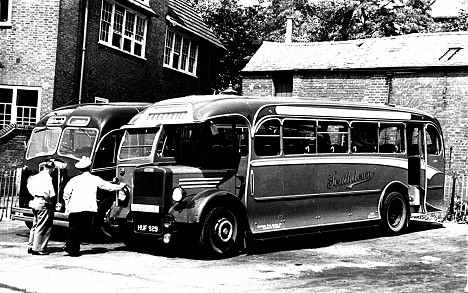
No. 1329 on a tour to Oxford and Windsor on a sunny day in the 1950s. The Southdown driver examines
the vehicle alongside (possibly a Guy Arab of Rickards Tours). He knows that his coach - and his uniform - are smarter... (Camlyn
photos).
Delivered between June 1947 and November 1949
Chassis: Leyland Tiger PS1/1 (7.4 litre oil engine), 27' 6" long.
Body: Duple C32R with sliding roof. Rebuilt by Beadle to a full-fronted FC32R design during 1954-55.
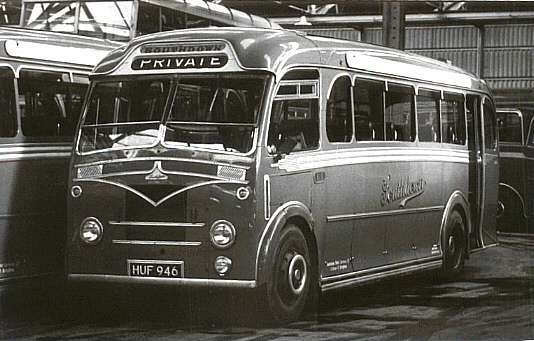
No. 1346 lost its original half-cab when rebuilt by Beadle in the 1950s. It was sold in 1960.
(Photo: Southdown enthusiasts club)
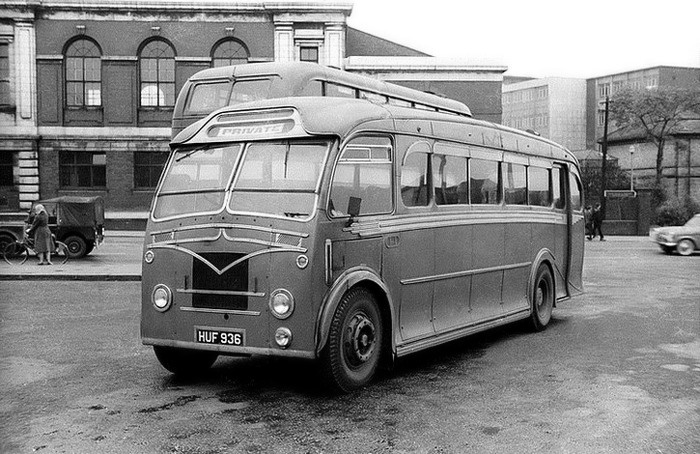
No. 1336 seen at Waterdale Bus Station, Doncaster on 12 May 1962 after sale by Southdown (along
with several others from the batch) to H. Pemberton Coaches of Upton, West Yorkshire. Photo by kind permission of Peter Bagshawe.
Notes: The last half-cab Tigers and the largest PS1 coach batch. Although later given full-fronts by
Beadle, they were not technically Beadle rebuilds, despite looking identical. The true Beadle rebuild (as detailed below) was a
radical reconstruction, involving integrating a new bodyshell onto pre-war Leyland running units (sometimes cutting up the chassis
to form front and rear sub-frames), whereas this batch retained the original chassis and most of the body - only the cab was
changed. Accordingly I am not classifying these with the Beadle rebuilds, even though they look just like them!
- 1312 (HUF 312) PS1/1 {470197} Duple {42573 B2020} deliv.8/47, based Eastbourne 1954. Rebuilt by Beadle to FC32R 1954 or 1955. Based at Eastbourne although spent most of its later life at Seaford depot. At Portslade 11/61 with all marks of ownership removed.
- 1313 (HUF 313) PS1/1 {470400} Duple {42574 B2021} deliv.9/47, based Eastbourne 1954. Rebuilt by Beadle to FC32R 1954 or 1955. Sold for scrap 1962.
- 1314 (HUF 314) PS1/1 {470401} Duple {42571 B2022} deliv.7/47, based Eastbourne 1954. Rebuilt by Beadle to FC32R 1954 or 1955. Sold 1962 to H. Pemberton, Upton, Yorks.
- 1315 (HUF 315) PS1/1 {470402} Duple {42569 B2023} deliv.7/47, based Porstmouth 1954. Rebuilt by Beadle to FC32R 1954 or 1955. Sold 1962 to H. Pemberton, Upton, Yorks.
- 1316 (HUF 316) PS1/1 {470403} Duple {42572 B2024} deliv.7/47, based Portsmouth 1954. Rebuilt by Beadle to FC32R 1954 or 1955. Withdrawn 4/61.
- 1317 (HUF 317) PS1/1 {470567} Duple {42566 B2025} deliv.6/47, based Portsmouth 1954. Rebuilt by Beadle to FC32R 1954 or 1955, Sold 1961 to Jackson, Cavan, Ireland, re-registered DID 619. Still there 1963.
- 1318 (HUF 318) PS1/1 {470568} Duple {42567 B2026} deliv.6/47, based Portsmouth 1954. Rebuilt by Beadle to FC32R 1954 or 1955, withdrawn 1961, possibly sold to Persia.
- 1319 (HUF 319) PS1/1 {470569} Duple {42565 B2027} deliv.6/47, based Portsmouth 1954. Rebuilt by Beadle to FC32R 1954 or 1955, withdrawn 1961, possibly sold to Persia.
- 1320 (HUF 320) PS1/1 {470867} Duple {42563 B2028} deliv.6/47, based Portsmouth 1954. Rebuilt by Beadle to FC32R 1954 or 1955. Sold 1961.
- 1321 (HUF 321) PS1/1 {470571} Duple {42568 B2029} deliv.6/47, based Eastbourne 1954. Rebuilt by Beadle to FC32R 1954 or 1955. Withdrawn c1961, possibly sold to Persia.
- 1322 (HUF 322) PS1/1 {470572} Duple {42564 B2030} deliv.6/47, based Littlehampton 1954. Rebuilt by Beadle to FC32R 1954 or 1955, withdrawn 1961, possibly sold to Persia.
- 1323 (HUF 323) PS1/1 {470642} Duple {42570 B2031} deliv.7/47, based Portsmouth 1954. Rebuilt by Beadle to FC32R 1954 or 1955. Sold 1961.
- 1324 (HUF 324) PS1/1 {471199} Duple {42575 B2036} deliv.10/47, based Littlehampton 1954. Rebuilt by Beadle to FC32R 1954 or 1955. Sold 1960, possibly to Persia.
- 1325 (HUF 325) PS1/1 {471105} Duple {42577 B2037} deliv.11/47, based Littlehampton 1954. Rebuilt by Beadle to FC32R 1954 or 1955. Sold 1962 to H Pemberton, Upton, Yorks. Later cut down at the rear and used as a tow wagon by T. D. Alexander (Greyhound).
- 1326 (HUF 326) PS1/1 {471301} Duple {42576 B2038} deliv.11/47, based Worthing 1954. Rebuilt by Beadle to FC32R 1954 or 1955. Sold 1961 to Turner (contractor), Bury.
- 1327 (HUF 927) PS1/1 {471109} Duple {42578 B2039} deliv.11/47, based Worthing 1954. Rebuilt by Beadle to FC32R 1954 or 1955. Active 1961, gone by 1962.
- 1328 (HUF 928) PS1/1 {471104} Duple {42579 B2040} deliv.11/47, based Portsmouth 1954. Rebuilt by Beadle to FC32R 1954 or 1955, withdrawn 1961, possibly sold to Persia.
- 1329 (HUF 929) PS1/1 {471198} Duple {42580 B2041} deliv.12/47, based Horsham 1954. Rebuilt by Beadle to FC32R 1954 or 1955. Sold 1962 to Pembertons, Upton, Yorks, then to Russell, Sutton in 1963.
- 1330 (HUF 930) PS1/1 {471194} Duple {42581 B2042} deliv.12/47, based Portsmouth 1954. Rebuilt by Beadle to FC32R 1954 or 1955. Sold 1960, possibly to Persia.
- 1331 (HUF 931) PS1/1 {471134} Duple {42582 B2043} deliv.12/47, based Worthing 1954. Rebuilt by Beadle to FC32R 1954 or 1955. Sold for scrap 1962.
- 1332 (HUF 932) PS1/1 {471352} Duple {45854 B2044} deliv.2/48, based Portsmouth 1954. Rebuilt by Beadle to FC32R 1954 or 1955. Withdrawn around 1961.
- 1333 (HUF 933) PS1/1 {471353} Duple {45856 B2045} deliv.5/48, based Portsmouth 1954. Rebuilt by Beadle to FC32R 1954 or 1955, withdrawn 1960, possibly sold to Persia.
- 1334 (HUF 934) PS1/1 {471193} Duple {45855 B2082} deliv.2/48, based Brighton area 1954. Rebuilt by Beadle to FC32R 1954 or 1955. To H.E.Collins (contractor), Drayton, Portsmouth in October 1961 as their no. 72.
- 1335 (HUF 935) PS1/1 {470869} Duple {45857 B2083} deliv.5/48, based Brighton area 1954. Rebuilt by Beadle to FC32R 1954 or 1955. Sold 1960, possibly to Persia.
- 1336 (HUF 936) PS1/1 {471070} Duple {45859 B2084} deliv.6/48, based Brighton area 1954. Rebuilt by Beadle to FC32R 1954 or 1955. Sold 1962 to H Pemberton, Upton, Yorks.
- 1337 (HUF 937) PS1/1 {470868} Duple {45858 B2085} deliv.6/48, based Brighton area 1954. Rebuilt by Beadle to FC32R 1954 or 1955. Active 1961, withdrawn by early 1962.
- 1338 (HUF 938) PS1/1 {491273} Duple {45860 B2090} deliv.5/49, based Brighton area 1954. Rebuilt by Beadle to FC32R 1954 or 1955. Withdrawn 4/61.
- 1339 (HUF 939) PS1/1 {491274} Duple {45861 B2091} deliv.5/49, based Brighton area 1954. Rebuilt by Beadle to FC32R 1954 or 1955. Withdrawn 4/61.
- 1340 (HUF 940) PS1/1 {491385} Duple {45865 B2092} deliv.6/49, based Portsmouth 1954. Rebuilt by Beadle to FC32R 1954 or 1955. Active 1961, gone by early 1962. With Farmery, South Emsall, Yorks in 1963.
- 1341 (HUF 941) PS1/1 {491388} Duple {45862 B2093} deliv.6/49, based Portsmouth 1954. Rebuilt by Beadle to FC32R 1954 or 1955. Withdrawn 1961, gone by 1962. With Ashley (contractor), Nottingham 1964.
- 1342 (HUF 942) PS1/1 {491387} Duple {45863 B2094} deliv.6/49, based Portsmouth 1954. Rebuilt by Beadle to FC32R 1954 or 1955. Active 1961, withdrawn by early 1962.
- 1343 (HUF 943) PS1/1 {491386} Duple {45864 B2095} deliv.6/49, based Eastbourne 1954. Rebuilt by Beadle to FC32R 1954 or 1955. Active 1956, sold 1960, possibly to Persian Gulf.
- 1344 (HUF 944) PS1/1 {491389} Duple {45866 B2096} deliv.6/49, based Portsmouth 1954. Rebuilt by Beadle to FC32R 1954 or 1955. Active 1961, at Portslade 11/61 with all marks of ownership removed. Sold 1962 to H. Pemberton, Upton, Yorks. Seen in a poor state in Monaghan, Ireland in April 1965, owner unknown.
- 1345 (HUF 945) PS1/1 {492053} Duple {45867 B2097} deliv.6/49, based Portsmouth 1954. Rebuilt by Beadle to FC32R 1954 or 1955. Withdrawn 1961. With Portsmouth Corporation Welfare Dept. in 1962.
- 1346 (HUF 946) PS1/1 {492452} Duple {45868 B2098} deliv.10/49, based Portsmouth 1954. Rebuilt by Beadle to FC32R 1954 or 1955, sold 1960, possibly to Persian Gulf.
- 1347 (HUF 947) PS1/1 {492453} Duple {45869 B2099} deliv.11/49, based Portsmouth 1954. Rebuilt by Beadle to FC32R 1954 or 1955. Sold 1960, possibly to Persian Gulf.
- 1348 (HUF 948) PS1/1 {493153} Duple {45870 B2100} half-sliding roof. Deliv.11/49, based Eastbourne 1954. Based Worthing later. Rebuilt by Beadle to FC32R 1954 or 1955. Sold 1961.
- 1349 (HUF 949) PS1/1 {493322} Duple {45871 B2101} deliv.11/49, based Eastbourne 1954. Rebuilt by Beadle to FC32R 1954 or 1955. Sold for scrap 1962.
- 1350 (HUF 950) PS1/1 {493323} Duple {45872 B2102} deliv.11/49, based Eastbourne 1954. Rebuilt by Beadle to FC32R 1954 or 1955. Sold for scrap 1962.
- 1351 (HUF 951) PS1/1 {493324} Duple {45873 B2103} deliv.11/49, based Eastbourne 1954. Rebuilt by Beadle to FC32R 1954 or 1955, withdrawn 1961, possibly sold to Persia.
TOTAL 125 (with 3 survivors, 1227, 1249 and 1303 )
THE BEADLE REBUILDS
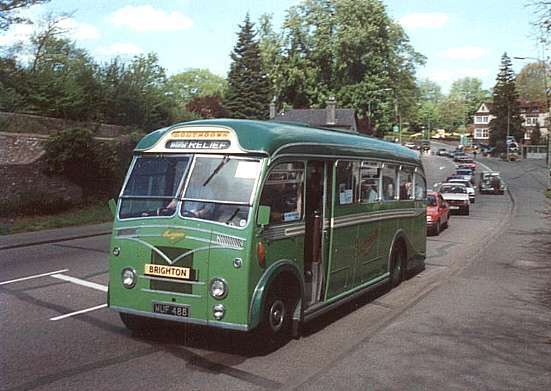
No. 888 (later 649) is the only surviving Southdown Beadle rebuild, and was preserved by the late
Bob Gray of Funtley. It is shown here at Patcham on the HCVS London to Brighton run in 1994. (Photo: Dick Gilbert)
In the immediate post-war years, with the half-cab design now considered somewhat dated, J. C. Beadle,
bodybuilders of Dartford, came up with a novel scheme for extending the lives of pre-war single deck vehicles. The process involved
integrating a new full-fronted body to pre-war Leyland running units.
Some shorter (26 foot) models were also built, which involved combining the new integral body with
front and rear sub-frames cut from the two ends of the original chassis, retaining the engine and all major systems. Both of these
conversions were universally known as the Beadle rebuilds.
Despite the age of their original chassis and engines, such vehicles were common in the South East
up to the mid 1960s, as fleets of them were purchased by Southdown, Maidstone and District and East Kent. In most cases operators
donated the running gear from their own older vehicles, but sometimes others were purchased for the purpose.
A full analysis of the 50 Southdown Beadle rebuilds can get fearfully complicated, not least because
all were given new fleet and registration numbers on conversion. Below is a breakdown of the two batches (one batch of 30 feet
length, and one of 26 feet), also showing the identity of the pre-war Southdown vehicle which donated its components. So far so
good, but the matter is then confused by a renumbering programme that took place in 1958-59.
The renumbering coincided with the conversion of ten of the shorter vehicles to buses, so the two
groups now became (1) ten buses - all short, and (2) the remaining 40 coaches - some short and some long - with gaps in the
sequence where the buses had been removed. Thus the original Tiger TS8s (or the major parts of them) had changed numbers twice.
Curiously no. 1470 of 1938 regained its original number again, exactly 21 years later - the only one to do so.
LEYLAND / BEADLE - 850-869 (Total 20)
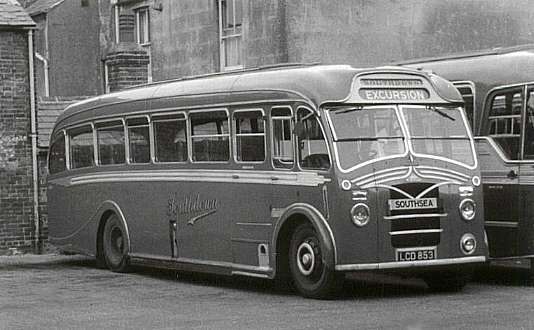
853, of the longer 30-foot batch, at Portsmouth in the 1950s. (Photo: Southdown enthusiasts club).
Delivered between March and June 1952
Type: Leyland / Beadle integral, 30 feet long, with 8.6 litre oil engine from pre-war Tiger TS8.
Body: FC35C (an 8ft wide body on a 7ft 6in chassis).
- 850 (LCD 850) Beadle-TS8 JCB259 Beadle B2114, deliv.7/52. Chassis rebuilt from 1433 (FCD 33). Based Brighton area 1954. Renumbered 1450 12/59. Sold 1963 to Gibson Ltd., Cheshire (contractors).
- 851 (LCD 851) Beadle-TS8 JCB260 Beadle B2115, deliv.3/52. Chassis rebuilt from 1204 (EUF 104). Based Portsmouth 1954. Renumbered 1451 12/59, sold to Glenn, Uppingham (no. 5) in 1963, but apparently seen with Kerridges (builders), Cambridge the same year.
- 852 (LCD 852) Beadle-TS8 JCB261 Beadle B2116, deliv.4/52. Chassis rebuilt from 1203 (EUF 103). Based Portsmouth 1954. Renumbered 1452 12/59, sold to Morlais, Merthyr Tydfil 1963.
- 853 (LCD 853) Beadle-TS8 JCB262 Beadle B2117, deliv.4/52. Chassis rebuilt from 1197 (EUF 97). Based Portsmouth 1954. Renumbered 1453 12/59, sold to Morlais, Merthyr Tydfil 1963.
- 854 (LCD 854) Beadle-TS8 JCB263 Beadle B2118, deliv.4/52. Chassis rebuilt from 1201 (EUF 101). Based Portsmouth 1954. Renumbered 1454 12/59, sold to Morlais, Merthyr Tydfil 1963.
- 855 (LCD 855) Beadle-TS8 JCB264 Beadle B2119, deliv.4/52. Chassis rebuilt from 1195 (EUF 95). Based Chichester 1954. Renumbered 1455 12/59. Sold 1963 to Sproat, Bedford and sold again immediately to Bates, Kenilworth.
- 856 (LCD 856) Beadle-TS8 JCB265 Beadle B2120, deliv.5/52. Chassis rebuilt from 1434 (FCD 34). Based Brighton area 1954. Renumbered 1456 12/59, sold to Mexborough and Swinton 1962 as no. 103, withdrawn by them in 1964.
- 857 (LCD 857) Beadle-TS8 JCB266 Beadle B2121, deliv.5/52. Chassis rebuilt from 1196 (EUF 96). Based Brighton area 1954. Renumbered 1457 12/59. Sold 1963 to Morlais, Merthyr.
- 858 (LCD 858) Beadle-TS8 JCB267 Beadle B2122, deliv.5/52. Chassis rebuilt from 1436 (FCD 36). Based Brighton area 1954. Renumbered 1458 12/59. Sold 1963.
- 859 (LCD 859) Beadle-TS8 JCB268 Beadle B2123, deliv.5/52. Chassis rebuilt from 1198 (EUF 98). Based Brighton area 1954. Renumbered 1459 12/59, sold to Mexborough and Swinton 1962 as no. 104, withdrawn by them in 1964.
- 860 (LCD 860) Beadle-TS8 JCB269 Beadle B2124, deliv.5/52. Chassis rebuilt from 1194 (EUF 94). Based Brighton area 1954. Renumbered 1460 12/59, sold to Mexborough and Swinton 1962 as no. 105, withdrawn by them in 1964.
- 861 (LCD 861) Beadle-TS8 JCB270 Beadle B2125, deliv.5/52. Chassis rebuilt from 1192 (EUF 92). Based Worthing 1954. Renumbered 1461 12/59. Sold 1963.
- 862 (LCD 862) Beadle-TS8 JCB271 Beadle B2126, deliv.5/52. Chassis rebuilt from 1202 (EUF 102). Based Worthing 1954. Renumbered 1462 12/59. Sold 1963.
- 863 (LCD 863) Beadle-TS8 JCB272 Beadle B2127, deliv.5/52. Chassis rebuilt from 1205 (EUF 105). Based Bognor 1954. Renumbered 1463 12/59. Sold 1963.
- 864 (LCD 864) Beadle-TS8 JCB273 Beadle B2128, deliv.5/52. Chassis rebuilt from 1191 (EUF 91). Based Portsmouth 1954. Renumbered 1464 12/59. Sold 1963.
- 865 (LCD 865) Beadle-TS8 JCB274 Beadle B2129, deliv.6/52. Chassis rebuilt from 1190 (EUF 90). Based Worthing 1954. Renumbered 1465 12/59, sold by 6/63 to Moor-Dale Bus Services, Newcastle.
- 866 (LCD 866) Beadle-TS8 JCB275 Beadle B2130, deliv.6/52 Chassis rebuilt from 1187 (EUF 87). Based Worthing 1954. Renumbered 1466 12/59. With Thomas Bros., Llangadog in 1963.
- 867 (LCD 867) Beadle-TS8 JCB276 Beadle B2131, deliv.6/52. Chassis rebuilt from 1186 (EUF 86). Based Brighton area 1954. Renumbered 1467 12/59. Sold 1963.
- 868 (LCD 868) Beadle-TS8 JCB277 Beadle B2132, deliv.6/52. Chassis rebuilt from 1460 (FCD 260). Based Eastbourne 1954. Renumbered 1468 12/59. Sold 1963.
- 869 (LCD 869) Beadle-TS8 JCB278 Beadle B2133, deliv.6/52. Chassis rebuilt from 1183 (EUF 83). Based Eastbourne 1954-1961. Renumbered 1469 12/59. Sold 1963.
LEYLAND / BEADLE - 870-899 (Total 30)
